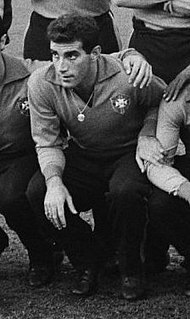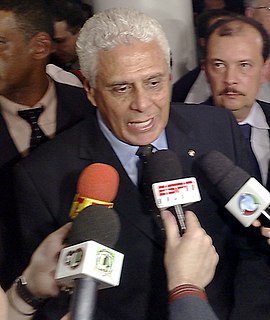- For another two Brazilian footballers nicknamedAlfredo, see Alfredo Ramos de Oliveira and Alfredo Mostarda Filho .
- For another people with this name, see Alfredo.
| Personal information | |||
|---|---|---|---|
| Full name | Alfredo dos Santos | ||
| Date of birth | January 1, 1920 | ||
| Place of birth | Rio de Janeiro, Brazil | ||
| Date of death | October 23, 1997 (aged 77) | ||
| Playing position | Midfielder | ||
| Senior career* | |||
| Years | Team | Apps | (Gls) |
| 1937–1948 | Vasco da Gama | ||
| 1949 | Flamengo | ||
| 1949–1956 | Vasco da Gama | ||
| National team | |||
| 1945–1950 | Brazil | 7 | (2) |
| * Senior club appearances and goals counted for the domestic league only | |||
Alfredo dos Santos, 1 best known as Alfredo II (January 1, 1920 – October 23, 1997) was a Brazilian footballer in midfielder role. He was born in Rio de Janeiro. [1] [2]

Brazil, officially the Federative Republic of Brazil, is the largest country in both South America and Latin America. At 8.5 million square kilometers and with over 208 million people, Brazil is the world's fifth-largest country by area and the fifth most populous. Brazil borders every South American country except Chile and Ecuador. Its capital is Brasília, and its most populated city is São Paulo. The federation is composed of the union of the 26 states, the Federal District, and the 5,570 municipalities. It is the largest country to have Portuguese as an official language and the only one in the Americas; it is also one of the most multicultural and ethnically diverse nations, due to over a century of mass immigration from around the world.

Rio de Janeiro, or simply Rio, is anchor to the Rio de Janeiro metropolitan area and the second-most populous municipality in Brazil and the sixth-most populous in the Americas. Rio de Janeiro is the capital of the state of Rio de Janeiro, Brazil's third-most populous state. Part of the city has been designated as a World Heritage Site, named "Rio de Janeiro: Carioca Landscapes between the Mountain and the Sea", by UNESCO on 1 July 2012 as a Cultural Landscape.
During his career (1937–1956), he played for Vasco da Gama, except one year with Flamengo (1949). [1] As another Alfredo played in Vasco, he earned the nickname "Alfredo Segundo" ("Alfredo the Second", transcribed as Alfredo II). [2] He won five Carioca Tournaments (1945, 1947, 1949, 1950 and 1952) [3] and the South American Club Championship in 1948. [4] For the Brazilian team he played at the 1950 FIFA World Cup, starting one match against Switzerland (2–2) on June 28, 1950 when he scored a goal in the third minute. [5]

Clube de Regatas do Flamengo, commonly referred to as Flamengo, is a Brazilian sports club based in Rio de Janeiro. Their most significant sporting outlet is the football team, which plays in the Campeonato Brasileiro Série A, being one of only five clubs to have never been relegated, along with Chapecoense, Santos, São Paulo and Cruzeiro.
Regnal numbers are ordinal numbers used to distinguish among persons with the same name who held the same office. Most importantly, they are used to distinguish monarchs. An ordinal is the number placed after a monarch's regnal name to differentiate between a number of kings, queens or princes reigning the same territory with the same regnal name.
The Campeonato Carioca, officially known as Campeonato Estadual do Rio de Janeiro, is the annual football championship of the state of Rio de Janeiro, Brazil. It was first held in 1906, and is these days organised by the Federação de Futebol do Estado do Rio de Janeiro, the state's football federation.











